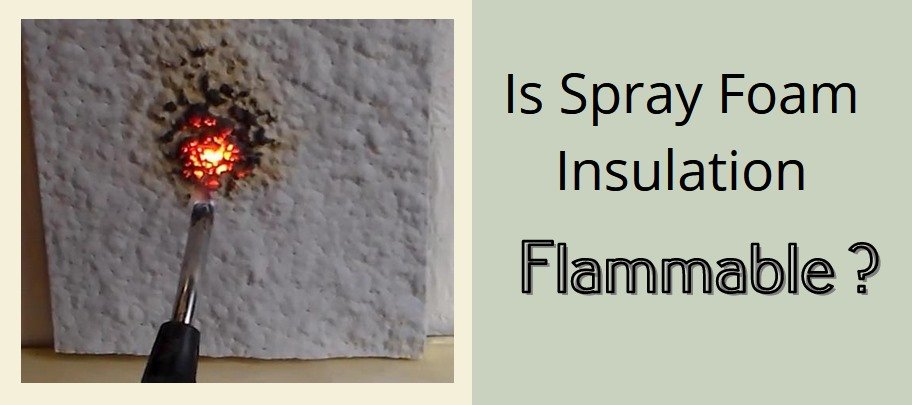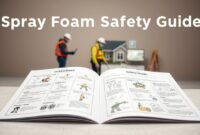Is spray foam insulation flammable? Spray foam, a widely used insulation material in buildings for its long-term cost-effectiveness, raises questions about its fire safety. People often wonder if it is combustible or completely fireproof, especially in light of building codes and fire resistance ratings.
Simply said, earlier forms of spray foam can enhance the combustibility of your property, but modern ones may be either fire retardant or perhaps even fire-resistant.
Furthermore, choosing the proper one can also rely on some other aspects. Although in general, those kinds of insulating spray foam are currently the safest type of foam in the marketplace.
How about Spray Foam Polyurethane?
This sort of spray foam is often popular during a fire outbreak. According to it, you must avoid it when deciding on a spray foam kind for the home. Whether you wonder if spray foam is combustible, the answer is a loud yes.

However, to be combustible, this spray foam type has molecular qualities that, whenever ignited, can make home inhabitants unconscious or even cause vision problems.
So, you should avoid it because it will almost certainly make your construction unsafe. Moreover, it does not fulfill the required criteria for home insulation.
Is Spray Foam Insulation Flammable?
Spray foam is flammable, and it requires careful handling. This is particularly true as spray foam can ignite and burn when exposed to a sufficient heat source. Despite its potential danger, this type of spray foam contains chemicals that emit smoke when burned, affecting the inhabitants’ health.
Since untreated foam becomes a fire accelerant, most of the products available include or must contain flame retardant.
The majority of foam options on the market are expanded polystyrene or polyurethane foam; both are derived from petroleum. Those foam products will fire aggressively if not handled. Then, it can expose high temperatures or flames, creating large amounts of smoke and spreading fire.
Spray foam’s advantages are its easiness to apply and how compact it works in aspects of sound and heat insulation.
But that is not as effective for avoiding flames as material such as Rockwool, which can resist temperatures up to 1.000 °C, is comparable to fiberglass, which does not flame as well.
Because the substance is out of the container, a highly combustible gas propellant is easy to force. So the spray foam in the can is very flammable whenever expelled from the can. When the foam is removed from the container, it begins to cure, and due to the kind of foam (whether flame-resistant or not), it can be highly combustible.
Is Spray Foam Flammable After It Dries?
Spray foam is useful for home improvement to repair and fill cracks and holes. The explosive gas, or methylene-diphenyl-diisocyanate 4,4, which can distribute the foam, is very combustible. That gas can be released with the foam as it stretches and cures. If there is an accelerant nearby, the gas might cause fires and explode.
Is Closed Cell Spray Foam Insulation Flammable?
Types of insulation like fiberglass, celluloid, or closed cell spray foam are processed with fire retardants to enhance fire safety and prevent fire hazards. Closed cell spray foam, in particular, adheres to the International Building Code for fire resistance ratings.
The large bulk of them are harmless and will not hurt your wellbeing if kept separate from you.
Closed-cell spray foam has been classified as class 1 fire resistant. It may not act as the catalyst in the event of a fire, but it will also extinguish itself once the flame is extinguished. Because it has a spray foam insulation fire rating of up to 4 hours, closed-cell spray foam is an excellent alternative for reducing gas and smoke.
Spray foam works well for sound and heat insulation, so several people utilize it for soundproofing. It is also incredibly easy to apply because it fills every corner and nook much more readily than fiberglass or Rockwool.
The difficulty is that it is very combustible and emits poisonous smoke, which may be dangerous to people.
When planning to install spray foam insulation, it’s crucial to understand its flammability characteristics. Spray foam insulation fire-resistant products are available, offering better safety in case of fire. However, it’s essential to choose the right type, such as open-cell spray foam or closed cell, based on the application and building codes. Foam insulation products should be selected with care to ensure they meet the required safety standards.
In conclusion of “is spray foam insulation flammable?”, you may use Rockwool for your entire soundproofing and insulating needs.


